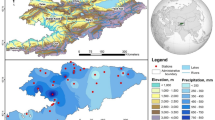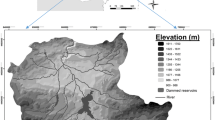Abstract
Fires are one of the main causes of environmental degradation as they have an impact on flora and fauna, can also strongly influence ecological and geomorphological processes and permanently compromise the functionality of the ecosystems and soils on which they impact. The severity of the fire event influences the superficial hydrological response and the consequent loss of soil. Precipitation on the basins recently affected by fires produces an increase in the outflow which commonly transports and deposits large volumes of sediment, both inside and downstream of the burned area. In the years following the fire, the loss of soil is very high and the degradation processes of the soils are much greater than in the pre-event. The aim of this study is to evaluate the potential annual loss due to post-fire erosion using remote sensing techniques, RUSLE (Revised Universal Soil Loss Equation) methodology and GIS tecniques in nine different event occurred in 2019 in the northern part of the Apulia Region (Southern Italy). Geographic Information System techniques and remote sensing data have been adopted to study the post-fire soil erosion risk. Satellite images are the most appropriate for environmental monitoring as they provide high resolution multispectral optical images, infact are able to monitor the development of vegetation by assessing the water content an changes in chlorophyll levels. This study can be useful to spatial planning authorities as a tool for assessing and monitoring eroded soil in areas affected by fires, representing a useful tool for land management.
Access this chapter
Tax calculation will be finalised at checkout
Purchases are for personal use only
Similar content being viewed by others

References
Bakker, M.M., Govers, G., Jones, R.A., Rounsevell, M.D.: The effect of soil erosion on Europe’s crop yields. Ecosystems 10(7), 1209–1219 (2007)
Caldara, M., Pennetta, L.: Lineamenti geografici della Provincia di Foggia. Bonifica 8(3), 13–24 (1993)
Cannon, S.H., Gartner, J.E., Wilson, R.C., Bowers, J.C., Laber, J.L.: Storm rainfall conditions for floods and debris flows from recently burned areas in southwestern Colorado and southern California. Geomorphology 96(3–4), 250–269 (2008)
Cremonini, G., Elmi, C., Selli, R.: Note illustrative della Carta geologica d’Italia alla scala 1: 100 000, foglio 156 S. Marco in Lamis (1971)
Csáfordi, P., Pődör, A., Bug, J., Gribovsyki, Z.: Soil erosion analysis in a small forested catchment supported by ArcGIS Model Builder. Acta Silvatica et Lignaria Hungarica 8(1), 39–56 (2012)
Doerr, S.H., Woods, S.W., Martin, D.A., Casimiro, M.: ‘Natural background’ soil water repellency in conifer forests of the north-western USA: its prediction and relationship to wildfire occurrence. J. Hydrol. 371(1–4), 12–21 (2009)
Elfadaly, A., Attia, W., Qelichi, M.M., Murgante, B., Lasaponara, R.: Management of cultural heritage sites using remote sensing indices and spatial analysis techniques. Surv. Geophys. 39(6), 1347–1377 (2018). https://doi.org/10.1007/s10712-018-9489-8
Fox, D.M., Darboux, F., Carrega, P.: Effects of fire-induced water repellency on soil aggregate stability, splash erosion, and saturated hydraulic conductivity for different size fractions. Hydrol. Process. Int. J. 21(17), 2377–2384 (2007)
Fu, B.J., et al.: Assessment of soil erosion at large watershed scale using RUSLE and GIS: a case study in the Loess Plateau of China. Land Degrad. Dev. 16, 73–85 (2005). https://doi.org/10.1002/ldr.646
Gallicchio, S., Moretti, M., Spalluto, L., Angelini, S.: Geology of the middle and upper Pleistocene marine and continental terraces of the northern Tavoliere di Puglia plain (Apulia, southern Italy). J. Maps 10(4), 569–575 (2014)
García-Ruiz, J.M., Nadal-Romero, E., Lana-Renault, N., Beguería, S.: Erosion in Mediterranean landscapes: changes and future challenges. Geomorphology 198, 20–36 (2013)
Gioia, D., Gallicchio, S., Moretti, M., Tropeano, M.: STUDIO GEOLOGICO E GEOMORFOLOGICO DEL RETICOLO IDROGRAFICO DEL SETTORE PUGLIESE DEL SUBAPPENNINO
Jacobacci, A., Malatesta, A., Martelli, G., Stampanoni, G.: Note illustrative della Carta Geologica d’Italia. Foglio 163–Lucera (1967)
Key, C.H.: Landscape assessment (LA): sampling and analysis methods. In: Lutes, D.C., et al. (eds.) FIREMON: Fire Effects Monitoring and Inventory System. USDA Forest Service, Rocky Mountain Research Station. General Technical Report RMRS-GTR-164-CD, Fort Collins (2006)
Key, C.H., Benson, N.C.: Landscape assessment (LA) sampling and analysis methods. USDA Forest Service General Technical Report, RMRS-GTR-164-CD (2006)
Kuo, K.T., Sekiyama, A., Mihara, M.: Determining C factor of universal soil loss equation (USLE) based on remote sensing. Int. J. Environ. Rural Dev. 7(2), 154–161 (2016)
Lanorte, A., Danese, M., Lasaponara, R., Murgante, B.: Multiscale mapping of burn area and severity using multisensor satellite data and spatial autocorrelation analysis. Int. J. Appl. Earth Obs. Geoinf. 20, 42–51 (2013)
Las Casas, G., Murgante, B., Scorza, F.: Regional local development strategies benefiting from open data and open tools and an outlook on the renewable energy sources contribution. In: Papa, R., Fistola, R. (eds.) Smart Energy in the Smart City. GET, pp. 275–290. Springer, Cham (2016). https://doi.org/10.1007/978-3-319-31157-9_14
Lasaponara, R., et al.: Spatial open data for monitoring risks and preserving archaeological areas and landscape: case studies at Kom el Shoqafa, Egypt and Shush, Iran. Sustainability 9(4), 572 (2017). https://doi.org/10.3390/su9040572
Lufafa, A., Tenywa, M.M., Isabirye, M., Majaliwa, M.J.G., Woomer, P.L.: Prediction of soil erosion in a Lake Victoria basin catchment using a GIS-based Universal Soil Loss model. Agric. Syst. 76(3), 883–894 (2003)
Maggiore, M., Masciale, R., Massari, R., Pappagallo, G., Passarella, G., Vurro, M.: Caratteri idrostrutturali del Tavoliere di Puglia ed elaborazione di una carta geolitologica a finalità idrogeologiche. Geologi e Territorio-Periodico di Scienze della Terra dell’Ordine dei Geologi della Puglia 2, 6–16 (2005)
Miller, J.D., Nyhan, J.W., Yool, S.R.: Modeling potential erosion due to the Cerro Grande Fire with a GIS-based implementation of the Revised Universal Soil Loss Equation. Int. J. Wildland Fire 12(1), 85–100 (2003)
Mitasova, H., Hofierka, J., Zlocha, M., Iverson, L.R.: Modelling topographic potential for erosion and deposition using GIS. Int. J. Geogr. Inf. Syst. 10(5), 629–641 (1996)
Moody, J.A., Martin, D.A.: Initial hydrologic and geomorphic response following a wildfire in the Colorado Front Range. Earth Surface Process. Landforms J. Br. Geomorphol. Res. Group 26(10), 1049–1070 (2001)
Moody, J.A., Shakesby, R.A., Robichaud, P.R., Cannon, S.H., Martin, D.A.: Current research issues related to post-wildfire runoff and erosion processes. Earth Sci. Rev. 122, 10–37 (2013)
Moretti, M., Gallicchio, S., Spalluto, L., Ciaranfi, N., Pieri, P.: Evoluzione geologica del settore settentrionale del Tavoliere di Puglia (Italia meridionale) nel Pleistocene medio e superiore. Il Quaternario 23(2), 181–198 (2010)
Murgante, B., Borruso, G., Lapucci, A.: Sustainable development: concepts and methods for its application in urban and environmental planning. In: Murgante, B., Borruso, G., Lapucci, A. (eds.) Geocomputation, Sustainability and Environmental Planning. Studies in Computational Intelligence, vol. 348, pp. 1–15. Springer, Heidelberg (2011). https://doi.org/10.1007/978-3-642-19733-8_1
Murgante, B., Borruso, G., Balletto, G., Castiglia, P., Dettori, M.: Why Italy first? Health, geographical and planning aspects of the COVID-19 outbreak. Sustainability 12, 5064 (2020)
Nolè, G., Lasaponara, R., Lanorte, A., Murgante, B.: Quantifying urban sprawl with spatial autocorrelation techniques using multi-temporal satellite data. Int. J. Agric. Environ. Inf. Syst. 5(2), 20–38 (2014). https://doi.org/10.4018/ijaeis.2014040102
Nyman, P., Sheridan, G.J., Smith, H.G., Lane, P.N.: Evidence of debris flow occurrence after wildfire in upland catchments of south-east Australia. Geomorphology 125(3), 383–401 (2011)
Panagos, P., Meusburger, K., Ballabio, C., Borrelli, P., Alewell, C.: Soil erodibility in Europe: a high-resolution dataset based on LUCAS. Sci. Total Environ. 479, 189–200 (2014)
Pascale, S., et al.: Landslide susceptibility mapping using artificial neural network in the urban area of Senise and San Costantino Albanese (Basilicata, Southern Italy). In: Murgante, B., et al. (eds.) ICCSA 2013. LNCS, vol. 7974, pp. 473–488. Springer, Heidelberg (2013). https://doi.org/10.1007/978-3-642-39649-6_34
Renard, K.G.: Predicting Soil Erosion By Water: A Guide to Conservation Planning with the Revised Universal Soil Loss Equation (RUSLE). United States Government Printing (1997)
Riley, K.L., Bendick, R., Hyde, K.D., Gabet, E.J.: Frequency–magnitude distribution of debris flows compiled from global data, and comparison with post-fire debris flows in the western US. Geomorphology 191, 118–128 (2013)
Robichaud, P.R.: Evaluating the effectiveness of postfire rehabilitation treatments (No. 63). US Department of Agriculture, Forest Service, Rocky Mountain Research Station (2000)
Santarsiero, V., Nolè, G., Lanorte, A., Tucci, B., Baldantoni, P., Murgante, B.: Evolution of soil consumption in the municipality of Melfi (Southern Italy) in relation to renewable energy. In: Misra, S., et al. (eds.) ICCSA 2019. LNCS, vol. 11621, pp. 675–682. Springer, Cham (2019). https://doi.org/10.1007/978-3-030-24302-9_48
Santi, P.M., Morandi, L.: Comparison of debris-flow volumes from burned and unburned areas. Landslides 10(6), 757–769 (2012). https://doi.org/10.1007/s10346-012-0354-4
Terranova, O., Antronico, L., Coscarelli, R., Iaquinta, P.: Soil erosion risk scenarios in the Mediterranean environment using RUSLE and GIS: an application model for Calabria (southern Italy). Geomorphology 112(3–4), 228–245 (2009)
Van Remortel, R.D., Hamilton, M.E., Hickey, R.J.: Estimating the LS factor for RUSLE through iterative slope length processing of digital elevation data within Arclnfo grid. Cartography 30(1), 27–35 (2001)
Wischmeier, W.H., Smith, D.D.: Predicting rainfall erosion losses - a guide for conservation planning. U.S. Department of Agriculture, Hyattsville, Agriculture Handbook No 537, p. 58 (1978)
Wischmeier, W.H., Smith, D.D.: Predicting rainfall-erosion losses from cropland east of the Rocky Mountains: Guide for selection of practices for soil and water conservation (No. 282). US Department of Agriculture (1965)
Author information
Authors and Affiliations
Corresponding author
Editor information
Editors and Affiliations
Rights and permissions
Copyright information
© 2020 Springer Nature Switzerland AG
About this paper
Cite this paper
Santarsiero, V. et al. (2020). Assessment of Post Fire Soil Erosion with ESA Sentinel-2 Data and RUSLE Method in Apulia Region (Southern Italy). In: Gervasi, O., et al. Computational Science and Its Applications – ICCSA 2020. ICCSA 2020. Lecture Notes in Computer Science(), vol 12252. Springer, Cham. https://doi.org/10.1007/978-3-030-58811-3_43
Download citation
DOI: https://doi.org/10.1007/978-3-030-58811-3_43
Published:
Publisher Name: Springer, Cham
Print ISBN: 978-3-030-58810-6
Online ISBN: 978-3-030-58811-3
eBook Packages: Computer ScienceComputer Science (R0)




